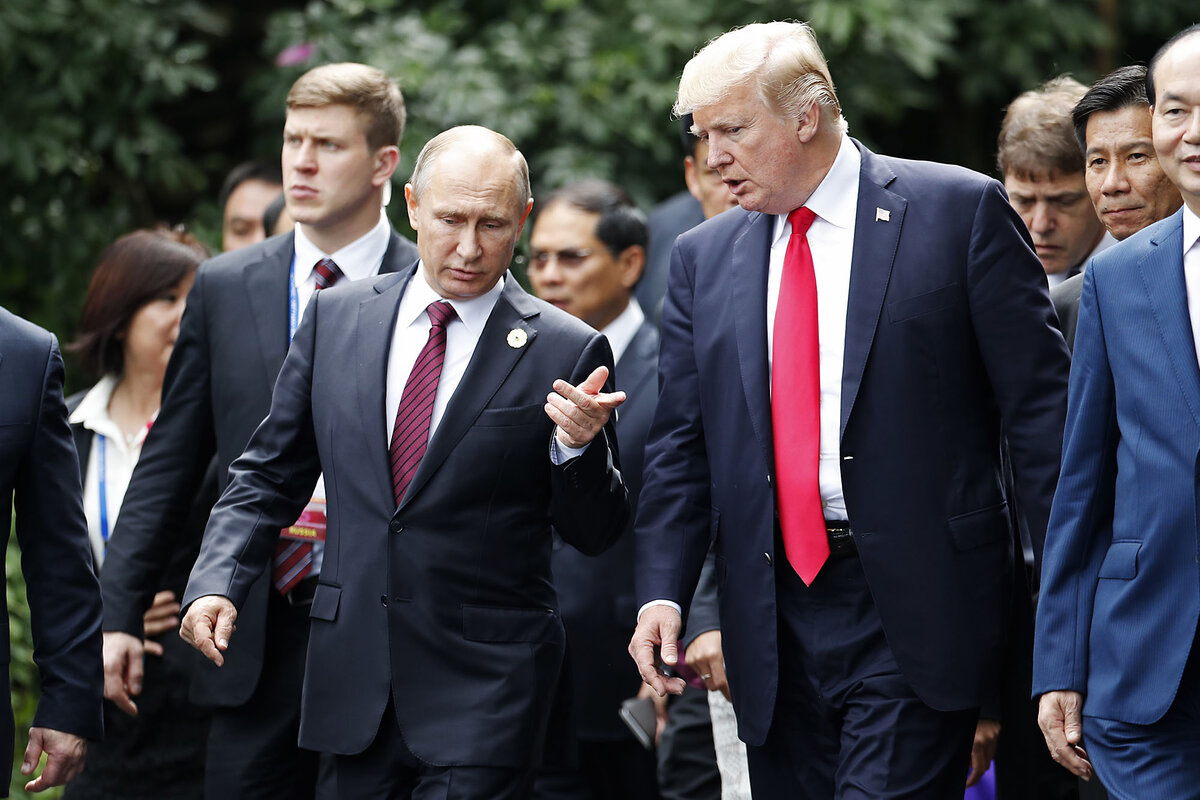Donald Trump for president? This time, Russia says, ‘No thanks.’
Loading...
| Moscow
Russian foreign policy experts express zero enthusiasm for another Donald Trump presidency, should he win the upcoming election. There’s a simple reason why.
They’ve already experienced one term of Mr. Trump in the White House, and it was the worst four years of their lives.
“Even if we assume that Trump genuinely wanted to improve relations with Moscow when he came in the first time, what he achieved was the exact opposite,” says Fyodor Lukyanov, editor of Russia in Global Affairs, a Moscow-based foreign policy journal. “There was chaos in Washington. There was a storm around Trump that affected anything to do with Russia, and it destroyed even the most modest efforts to start a dialogue.”
Why We Wrote This
Russians are not enthusiastic about the idea of Donald Trump’s return to the White House. While Mr. Trump may admire Vladimir Putin, the Kremlin found the chaos that surrounds Mr. Trump more trouble than it’s worth.
Russians remain fascinated with U.S. politics. The official media has covered each dramatic turn of the 2024 presidential race over the past couple of months with a mixture of excitement, bafflement, and dark schadenfreude. But gone is any expectation that the winner is likely even to slow the relentless downward spiral of U.S.-Russia relations, much less find the new level of mutual understanding, perhaps a U.S.-Russia compact, that they once hoped for.
Most Russian analysts seem to view Kamala Harris as a continuation of the Joe Biden administration, which has solidly backed Ukraine and hit Russia with the most intense blizzard of sanctions in history. As for Mr. Trump, even his pledge to end the Ukraine war “in 24 hours” is seen as empty verbiage at best or, more likely, a cynical effort to tap into the war-weariness of the U.S. electorate.
“The Russian media coverage of the upcoming U.S. elections seems rather objective to me,” says Lev Lurye, a St. Petersburg-based historian. “The general idea is that either Trump or any candidate from the Democratic Party will be equally bad for Russia.”
Frustration with Trump’s leadership
When it was announced that Mr. Trump had defeated Hillary Clinton back in November 2016 to become president, the entire State Duma – Russia’s lower house of parliament – rose to their feet and delivered a noisy, sustained standing ovation.
Such were the hopes aroused, not only among officials but ordinary Russians as well, by Mr. Trump’s expressions of admiration for Russian President Vladimir Putin and promises during his first presidential campaign that he would find ways to “get along with Russia.”
But they quickly were dashed once he entered office.
Many Russians were bemused by the #Russiagate scandal, which saw Mr. Trump mired in accusations that he had colluded with the Kremlin in unsavory ways for years, that he was profiting from lucrative business deals in Moscow, and that Russian internet trolls had helped to secure his election by manipulating social media in the U.S. Most of those accusations turned out to be false or greatly exaggerated, but at the time they dogged any conversation about Mr. Trump’s Russia policy and seemed to make any progress impossible.
It all came to a head at the July 2018 Helsinki summit, where Mr. Putin tried to press Russia’s agenda on issues like the war in Syria and nuclear arms control. But the summit was quickly overshadowed by Mr. Trump’s unusually deferential stance toward the Russian leader, which triggered a strong critical response among U.S. media and officials.
“The main thing that struck me, watching that show in Helsinki, was the total mismatch between the substantive issues that two leaders were supposed to be discussing, and the utter lack of interest in any of those things that was displayed at the press conference,” says Mr. Lukyanov. “Nobody wanted to hear anything about the actual agenda. They were only interested in some supposed secret relationship between Trump and Putin.”
“We thought that Trump was different”
The widespread view in Moscow now seems to be that U.S. hostility to Russia is hardwired, and unlikely to change regardless of whoever becomes president.
“Much of the Russian political elite thinks that the U.S. deep state is in charge, directing events, and no political actors can change anything,” says Alexei Mukhin, director of the independent Center for Political Information, a Moscow think tank. “We thought that Trump was different, but now it looks like he’s just another agent of the deep state.”
But some watch the electoral turbulence, the deep polarization, and the somewhat disorderly changes at the top with a bit of satisfaction. The way the former Soviet Union tried to reform itself with a younger leader, and then collapsed, is a staple analogy in Russian news commentaries.
Sergei Markov, a former Kremlin adviser, says Russia is less interested in U.S. political developments and more concerned about the shifting global order, in which Russians perceive the U.S. steadily losing ground. New faces such as Ms. Harris aren’t likely to reverse the underlying dynamics of decay, he argues.
“All that’s happening in the U.S. is just what we’ve been saying for some time,” he says.
“Some Russians are enjoying the spectacle of chaos in American politics, because they think that the more disruption in the U.S., the better things will be for us,” says Mr. Markov. “I think we should be careful what we wish for. This is a very dangerous time, and there is a possibility that expanding crises can lead to a real world war. That would be catastrophic.”







